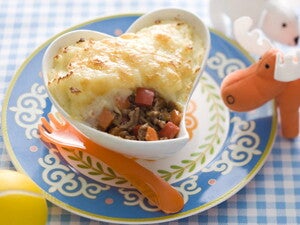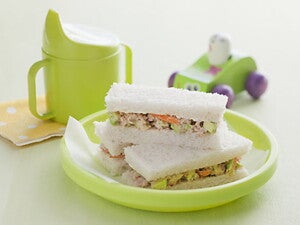
Filling a Toddler’s Nutrition Gaps
It’s important to understand toddlers’ eating habits and nutrient intakes to ensure they’re meeting their needs for healthy growth and development. These are some common nutrition gaps that may appear in toddlers.
Fruits and vegetables contain essential vitamins, minerals and fibre. A diet high in fruits and veggies is important for healthy growth and development.
How to get it: Offer your toddler ½ serve of fruit and 2-3 serves of vegetables every day. Fruit and vegetable servings can be from fresh, frozen or canned foods, but need to be cut up into small, easy-to-eat pieces. Remember you can still serve purees in toddler-favourite foods to add variety.
Fibre plays a big role in your child’s digestive health and regular bowels. An adequate intake for toddlers is 14 grams per day.
How to get it: Every day offer whole grains, and fresh or canned fruits and vegetables that are the right size and texture for your child.
Vitamin E is an important antioxidant that helps protect the cells in the body from damage.
How to get it: Foods that have Vitamin E include vegetable oils (canola, corn, soybean), avocados, whole grains and some leafy green vegetables (spinach, broccoli).
Potassium is a mineral that helps muscles work properly.
How to get it: Potassium is found in many foods, including potatoes, sweet potatoes, avocado, spinach, yogurt, bananas and citrus fruits.
Healthy fats contain important kilojoules for growth. Fat also helps the body use vitamins, such as Vitamins A, D, E and K. A toddler’s diet should include about 20 to 35% of total energy intake from fat, preferably mono- and polyunsaturated fats like those found in fish, avocados, and foods made with vegetable oils, such as canola and soybean oil. These healthy fats are preferable over saturated fats found in fatty meats such as hot dogs, bacon and sausages.
How to get it: Try preparing foods with fat like soy or canola oil, that also have the Omega-3 fat, alpha-linolenic acid, or offer condiments such as mayonnaise or salad dressings made with these oils. Remember to limit foods high in saturated and trans fats.
Avoid sweetened beverages and desserts. There’s not a lot of room in your toddler’s diet for foods that provide energy but not many nutrients. Desserts, sweets and sweetened beverages can be high in kilojoules compared to the micronutrients they provide, and can displace other nutritious foods in the diet.
How to replace it: In place of sweets, serve your toddler more nutritious options such as fruits, yoghurt and cereals and snacks that are made with whole grains.





